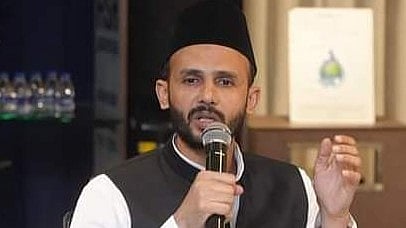
Zia Ur Rehman Barq.
Credit: X/@barq_zia
New Delhi: Samajwadi Party MP from Sambhal , Zia Ur Rehman Barq, has filed a plea in the Supreme Court challenging the Waqf (Amendment) Act, 2025, claiming it undermines the religious independence of the Muslim community and discriminates against them by introducing restrictions that do not apply to the governance of other religious endowments.
In a writ petition filed through advocate Sulaiman Mohd Khan, the leader said the legislation is manifestly arbitrary, ultra vires the Constitution and infringes upon the fundamental rights guaranteed to the citizens of India.
"The Amendment Act, in its content and operation, is violative of Articles 14 and 15, as it introduces unreasonable and discriminatory classifications without any intelligible differentia or rational nexus to the objective sought to be achieved. Furthermore, it impinges upon the rights guaranteed under Articles 25 and 26 by interfering with the freedom of conscience," the plea said.
The plea urged the court to declare the Waqf (Amendment) Act, 2025, unconstitutional as in violation of fundamental rights.
It contended that the Act imposed unreasonable limitations on the management and oversight of Waqf properties, consequently undermining the religious independence of the Muslim community.
The plea claimed Hindu and Sikh religious trusts continued to benefit from a level of self-regulation, whereas the amendments to the Waqf Act, 1995, significantly enhanced state intervention in the management of Waqf matters.
It also contended that the Act imposed restrictions on the establishment of Waqfs contingent upon the duration of an individual's religious practice.
"Such a limitation lacks a basis in Islamic law, tradition, or established precedent and constitutes an infringement of the fundamental right to profess and practice one's religion as guaranteed by Article 25. Furthermore, this restriction disproportionately affects individuals who have recently converted to Islam and seek to dedicate property for religious or charitable purposes, thereby contravening Article 15," it said.
The petition filed by advocate on record Usman Ghani Khan also raised the issue of omission of the concept of Waqf-by-User.
"The amendments significantly erode the constitutional protection of property rights guaranteed under Article 300A. By enhancing State control over waqf assets, restricting individuals' ability to make voluntary dedications for religious purposes, and subjecting waqf properties to increased governmental scrutiny, the Amendment Act imposes unjustified limitations on both religious freedom and property rights," the plea said.
